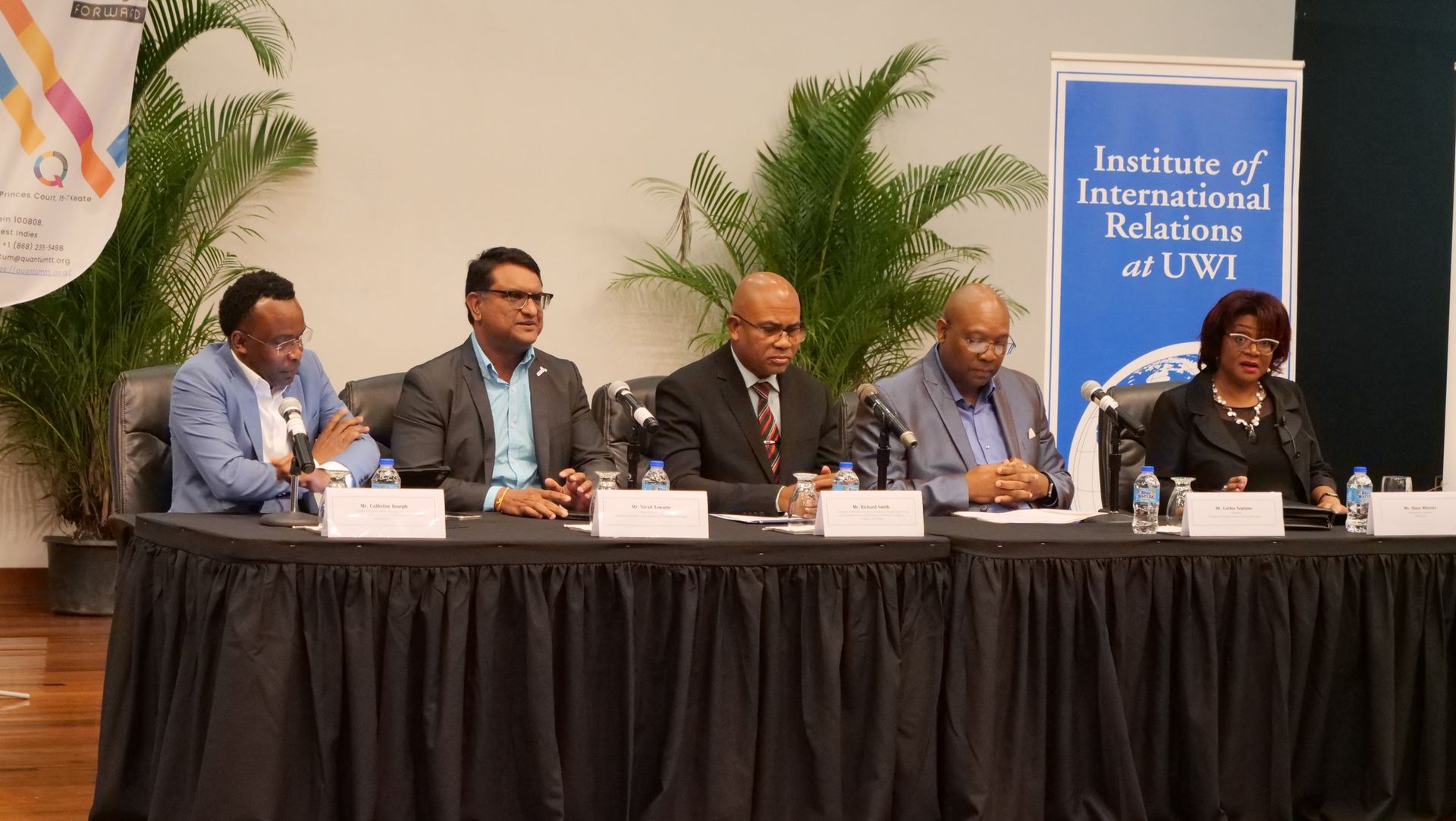
TOPIC: Managing Security Risks of the Business Sector: The Views on the Role of Private Security Industry and TTPS
February 13th, 2025
Institute of International Relations, UWI
Thank you, Madam Moderator, Minister of National Security, the Honourable Fitzgerald Hinds, and all other dignitaries. Pleasant good evening to you all.
I want to thank Dr. Pawinski and Dr. Muntook for having me here. It’s always humbling to be invited by an institution where I was once a student to participate in a forum such as this.
This is a really complex issue, as are many of the challenges we face. I find that when we have these discussions, we tend to localize them and put them into silos. However, the speakers who have gone before me have offered excellent and practical suggestions.
I am not from the security industry, and I’m sure Mr. Neptune will respond to Mr. Joseph appropriately. I also see my friend Darren Carmichael in the audience—he likely has much more expertise in this area than I do.
What I would say is this: the primary reason we, as citizens of any country, give up some of our rights to the government is for security. That is the minimum we should expect as citizens of any state. Right now, we are facing a crisis, and we must work together to resolve it. We also need to recognize how interconnected everything is.
As someone who has represented the private sector in two institutions for the last 15-plus years, I will say, without fear of contradiction, two things:
1. The private sector is deeply committed to Trinidad and Tobago and is willing to collaborate on any initiative that improves our society, including security—both in hard and soft ways.
2. According to multiple studies, the private sector in Trinidad and Tobago is more generous in its Corporate Social Responsibility (CSR) initiatives than the global average. This means businesses are willing to invest in solutions they believe will make a difference.
However, to truly contribute, we need to understand the broader strategy—the macro plan—and how we can fit into it to provide meaningful support. While initiatives are already in place, there is still significant room for increased collaboration. From our perspective, there must also be a greater willingness to accept this collaboration. In other words, we are eager to help—just tell us how, and ensure that our efforts contribute to meaningful change.
We must address the immediate crisis while also implementing medium- and long-term strategies. But at the same time, we must acknowledge that progress is being made. One example is the Adopt-a-School program, which I frequently highlight because I believe schools are at the core of solving our crime issues. If we focus on fixing schools and working with students and their families, we can make a real difference within a relatively short timeframe—let’s say, a 10-year horizon.
In the immediate term, there is also the work being done by ACP Smith and his colleagues.
Regarding the specific question about how the private security industry can work with the police, everyone who knows me knows that I speak my mind—sometimes controversially. I firmly believe that our ultimate goal should be to reduce the need for both private security and police officers in Trinidad and Tobago. We want to reduce crime and create a safer society, not sustain an industry that thrives on fear and insecurity.
That said, reducing crime does not mean businesses will disappear or become unprofitable. As AMCHAM, we want businesses to thrive—but not at the expense of society. If we share this goal, we must focus on solutions that actively contribute to crime reduction.
One possible solution—within the bounds of the law—is to explore international agreements that allow for highly trained private security teams to supplement the national security apparatus. This has been done before, where officers from outside of Trinidad and Tobago were granted Special Reserve Police (SRP) status to assist local law enforcement. If implemented effectively, such measures could help suppress gang activity and other criminal elements, providing breathing room for longer-term reforms to take effect.
These times demand thinking outside the box. At AMCHAM, we are already deeply involved in the soft aspects of crime prevention, but we also recognize the urgency of the current crisis.
You may recall that AMCHAM Trinidad and Tobago supported the State of Emergency as a means of providing that breathing room and signaling that we are all in this together. However, we must continue working to find new and innovative solutions.
Here are three specific recommendations for collaboration between the TTPS and the private security industry:
1. Regular information-sharing sessions between the TTPS and private security companies—both at the regional and national levels. A model to follow could be the OSAC (Overseas Security Advisory Council) approach used by US embassies, which fosters dialogue and intelligence-sharing between law enforcement and private security stakeholders.
2. Expanding the Eagle Eye program, which has already seen some success in various communities. Strengthening collaboration between private security firms and the TTPS—particularly in sharing footage and intelligence—could significantly enhance crime-fighting efforts.
3. Streamlining administrative processes such as obtaining Certificates of Character and Firearm User’s Employee Certificates (FUECs) for private security officers. Proper screening and efficient licensing will ensure that security personnel are well-vetted and properly equipped.
I’ll stop here and once again thank you for the opportunity to be part of this discussion. I appreciate your time and attention.
Thank you.
END.